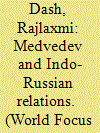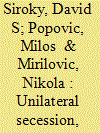| Srl | Item |
| 1 |
ID:
109731


|
|
|
| 2 |
ID:
082917


|
|
|
| 3 |
ID:
182671


|
|
|
|
|
| Summary/Abstract |
Recognition of aspiring states from established countries is central to becoming a member state of the international system. Previous research suggests that great power recognition decisions regarding aspiring states rapidly converge toward either recognition or non-recognition, yet great power convergence has still not occurred in the case of Kosovo after more than ten years. Unilateral secessions typically remain wholly unrecognized, since they violate the norm of home state consent, yet Kosovo has now been recognized by more than 100 countries. Why do some countries extend recognition to unilateral secessions, and do so early, whereas others delay recognition or withhold it altogether? In the case of Kosovo, great power influence and contestation, rather than convergence, have played a key role in shaping recognition decisions. We argue that countries in the US sphere of influence, with strong economic and military ties, are more likely to recognize Kosovo and to do so relatively fast, whereas countries influenced by Russia are less likely to recognize Kosovo at all, or to do so only after an extended delay. However, great powers are not equal in influencing other states to adopt their preferred position, since the USA is more powerful than Russia and can benefit from working alongside allies within the Western-oriented world order. We estimate a non-proportional Cox model with new time-varying data on Kosovo recognition and provide evidence that US military ties influenced other countries in extending recognition to unilateral secession.
|
|
|
|
|
|
|
|
|
|
|
|
|
|
|
|